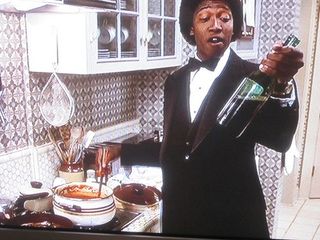Neil Simon rung in the new decade by embracing the new generation of comedy stars – represented by SNL’s Chevy Chase and Laugh-In’s Goldie Hawn. Tacking on Charles Grodin, whom he had used earlier in The Heartbreak Kid, he now had a trio with which to craft a direct-to-screen work called Seems Like Old Times, a comedy set in the modern day but really a complete throwback to the chatty screwball comedies of the 30s. Sure, it has the trademark Simon touches (repeated motifs, colorful characterizations, quick wit) but it certainly feels closer to The Philadelphia Story than the current comedies, like Caddyshack and Meatballs.
Chase is Nick Gardenia, a writer (Simon’s proxy here) who
gets kidnapped by some criminals and forced to rob a bank. The surveillance
camera gets perfectly clear picture of him (perhaps too clear to suspend disbelief), and gets sent all over, including
the office of the local D.A. (or the hopeful one, at least), Ira Parks
(Grodin). The catch: Ira is married to Glenda, Nick’s ex-wife, and all the
prosecutor needs now is to have a suspected felon connected to him in any way. Of
course Nick finds his way to his old flame, and Ira must contend with his
wife’s batty antics while wrestling with his promotion, which of course is in
the very hands of the governor he’s invited to dinner – the same occasion a
certain Mr. Gardenia has crashed and now serves dinner at – with the hopes of
clearing his name my turning himself in. And as Shakespeare himself said, all’s
well that ends well: authorities find a way of clearing Nick’s name, and it all
comes down to a court case in which Glenda’s two husbands and herself testify
in court – she the defense, and Ira the prosecution.
Well, the ending is certainly a dues ex machina, but isn’t
that how all those 30s gems concluded as well? The plot doesn’t stand up to
such scrutiny – wouldn’t there be a conflict of interest with Glenda
representing her ex-husband, and all her employees (running gag), while challenging her current husband in court? But then again, this isn’t Law and Order, it’s harmless fun, and
the craziness does come to a head during the big dinner scene as this sort of
film is meant to do. Throw in about a dozen dogs and a funny bit on how Glenda
has to cook her own Chicken Pepperoni (see – rule of funny phrases – you
laughed, didn’t you?) and you’ve got a winning gagfest that only a Scrooge
could dismiss. I sure didn’t; I got through the whole thing in one sitting –
rare for a guy who has two kids and must get movies in nap-wise.
Not much more to say here – it works, plain and simple – and
perhaps the only thing more golden than hearing glorious classic-era Simon
dialogue are ample scenes of Goldie Hawn in a black nightie. She was in her
prime, too, and part of my enjoyment of this film is the remembrance of these
talented. and attractive, stars in movies that they just don’t make anymore.
Mature adults reciting mature lines that could be a bit saucy at times but
never childish. Films wre mde up of acts, which were made up of scenes (real
scenes) which were made up of lines, pure and simple. How did we get away from
that?
 |
| "One Chicken Pepperoni, coming up! |
Stage in Simon’s life: none, really, but probably just
paying homage to those zany screwballs from the 30s, the way Bogdonavich did
with What’s Up Doc?
Rating: ***



No comments:
Post a Comment